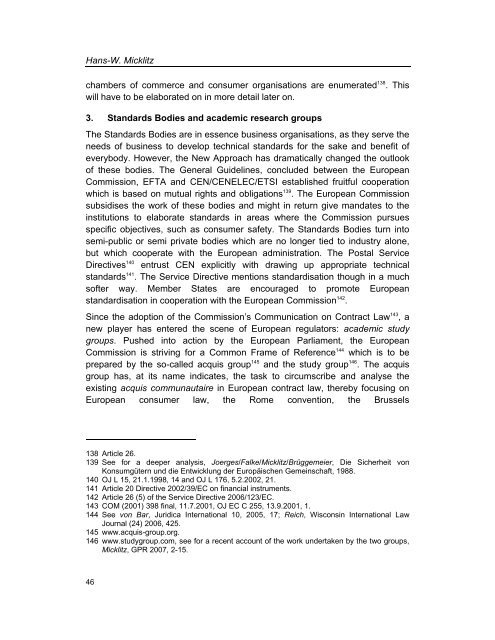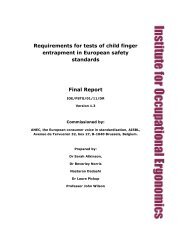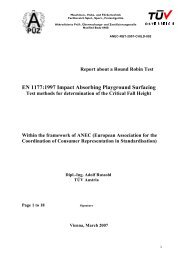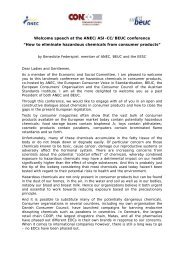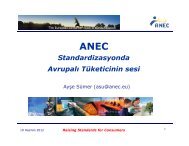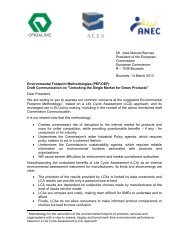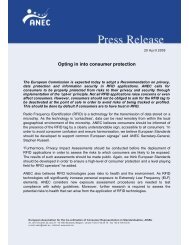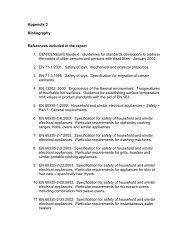Services Standards: Defining the Core Consumer Elements ... - ANEC
Services Standards: Defining the Core Consumer Elements ... - ANEC
Services Standards: Defining the Core Consumer Elements ... - ANEC
You also want an ePaper? Increase the reach of your titles
YUMPU automatically turns print PDFs into web optimized ePapers that Google loves.
Hans-W. Micklitz<br />
chambers of commerce and consumer organisations are enumerated 138 . This<br />
will have to be elaborated on in more detail later on.<br />
3. <strong>Standards</strong> Bodies and academic research groups<br />
The <strong>Standards</strong> Bodies are in essence business organisations, as <strong>the</strong>y serve <strong>the</strong><br />
needs of business to develop technical standards for <strong>the</strong> sake and benefit of<br />
everybody. However, <strong>the</strong> New Approach has dramatically changed <strong>the</strong> outlook<br />
of <strong>the</strong>se bodies. The General Guidelines, concluded between <strong>the</strong> European<br />
Commission, EFTA and CEN/CENELEC/ETSI established fruitful cooperation<br />
which is based on mutual rights and obligations 139 . The European Commission<br />
subsidises <strong>the</strong> work of <strong>the</strong>se bodies and might in return give mandates to <strong>the</strong><br />
institutions to elaborate standards in areas where <strong>the</strong> Commission pursues<br />
specific objectives, such as consumer safety. The <strong>Standards</strong> Bodies turn into<br />
semi-public or semi private bodies which are no longer tied to industry alone,<br />
but which cooperate with <strong>the</strong> European administration. The Postal Service<br />
Directives 140 entrust CEN explicitly with drawing up appropriate technical<br />
standards 141 . The Service Directive mentions standardisation though in a much<br />
softer way. Member States are encouraged to promote European<br />
standardisation in cooperation with <strong>the</strong> European Commission 142 .<br />
Since <strong>the</strong> adoption of <strong>the</strong> Commission’s Communication on Contract Law 143 , a<br />
new player has entered <strong>the</strong> scene of European regulators: academic study<br />
groups. Pushed into action by <strong>the</strong> European Parliament, <strong>the</strong> European<br />
Commission is striving for a Common Frame of Reference 144 which is to be<br />
prepared by <strong>the</strong> so-called acquis group 145 and <strong>the</strong> study group 146 . The acquis<br />
group has, at its name indicates, <strong>the</strong> task to circumscribe and analyse <strong>the</strong><br />
existing acquis communautaire in European contract law, <strong>the</strong>reby focusing on<br />
European consumer law, <strong>the</strong> Rome convention, <strong>the</strong> Brussels<br />
138 Article 26.<br />
139 See for a deeper analysis, Joerges/Falke/Micklitz/Brüggemeier, Die Sicherheit von<br />
Konsumgütern und die Entwicklung der Europäischen Gemeinschaft, 1988.<br />
140 OJ L 15, 21.1.1998, 14 and OJ L 176, 5.2.2002, 21.<br />
141 Article 20 Directive 2002/39/EC on financial instruments.<br />
142 Article 26 (5) of <strong>the</strong> Service Directive 2006/123/EC.<br />
143 COM (2001) 398 final, 11.7.2001, OJ EC C 255, 13.9.2001, 1.<br />
144 See von Bar, Juridica International 10, 2005, 17; Reich, Wisconsin International Law<br />
Journal (24) 2006, 425.<br />
145 www.acquis-group.org.<br />
146 www.studygroup.com, see for a recent account of <strong>the</strong> work undertaken by <strong>the</strong> two groups,<br />
Micklitz, GPR 2007, 2-15.<br />
46


